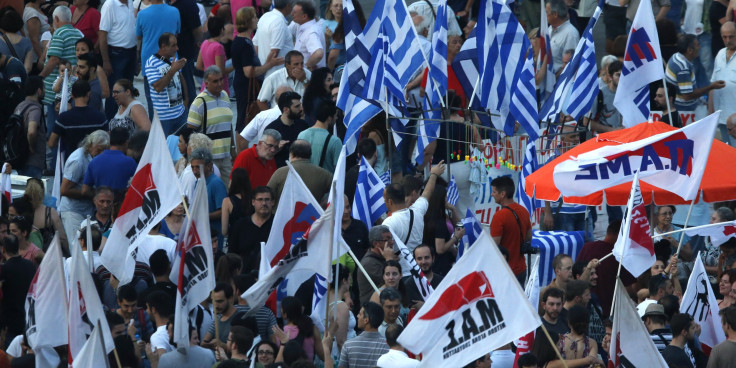Greek Parliament Backs Bailout: Was The Greek Referendum Completely Pointless?

In a plot with more twists and turns than King Minos’ mythical labyrinth, Greece is set to sign a deal with its creditors that promises more austerity than the proposal rejected by Sunday’s referendum. Following countrywide celebrations for the 61 percent who voted “oxi” (“no”) to the terms set out by the European Central Bank and others, last weekend's revelers have woken up to a hefty headache following the news that the Greek parliament voted overwhelmingly to back the government's bailout proposals set out on Friday as the basis for further negotiations.
Greek Prime Minister Alexis Tsipras had hailed last Sunday's referendum as a momentous victory. “The Greek people made a historic and brave choice,” he tweeted, before adding in a televised address, “Democracy won’t be blackmailed."
The Greek people made a historic and brave choice. Their response will alter the existing dialogue in Europe. #Greece #Greferendum
— Alexis Tsipras (@tsipras_eu) July 5, 2015Less than a week later, Tsipras seems less sure. The main reason for calling the referendum was to bolster Greece’s bargaining power. But this badly backfired when German Chancellor Angela Merkel decided to use the referendum to force Tsipras’ hand. “Deal or no deal” was Merkel’s preferred game, with fellow players European Commission President Jean-Claude Juncker and Eurogroup President Jeroen Dijsselbloem happy to apply extra pressure using the specter of a eurozone exit as a weighty bargaining tool.
But while the Eurogroup are talking realpolitik, what do Greek citizens make of the situation? Is Angela Merkel the Minotaur lurking at the end of Austerity Tunnel? Yiannis Baboulias is a 28-year-old journalist living in Athens. He, along with girlfriend Niki Seth-Smith, is the co-founder of Precarious Europe, a grassroots organization dedicated to documenting the experiences of young people in Europe. Like many other young, educated Greeks he left the country for more prosperous shores, settling as a journalist in London for seven years before relocating to Athens last November at the insistence of his English girlfriend, who wanted to experience life on the ground.
They've certainly done that, more than either of them could have imagined. When they first heard about the capital controls that the Greek government imposed a little under two weeks ago, Baboulias, fearing a complete economic meltdown, rushed to the butcher to stock up on meat, while Seth-Smith worried that she wouldn’t be able to get contraceptive pills. Their fears were unfounded, but recent events have left them convinced that negotiations are nearing their limit.
“Either we make the deal [with the eurozone] or we’ve reached the end,” Baboulias told International Business Times. “People are more bewildered by the situation than anything else -- the Greek people are facing impossible odds.” Baboulias, although sympathetic to the "no" campaign, chose not to vote, thinking it would have little effect on the outcome in Brussels. He's unsurprised by Tsipras’ about-face, believing he couldn’t have done anything else. “Syriza [Alexis Tsipras' party] dominates Greek politics -- it’s the only political force for good right now.”
For Baboulias, and thousands of other young Greeks who reject austerity, membership in the eurozone, and even in Europe, is not inviolable. As Baboulias wrote in a comment piece last week, “The European Union has spread suspicion among the people it was supposed to unite and condemned its youth to unemployment and cynicism. This can’t go on.”
But that’s a risk Tsipras was unprepared to take. In the early hours of Saturday morning, his government convinced parliament to accept the spending cuts and tax increases in return for a 53.5 billion euro state-saving payout. He knew the stakes were high. Earlier Friday he told his MPs, “I have the feeling we've reached the demarcation line. From here on, there is a minefield."
The people of Greece seem to agree -- in tavernas, homes and cafes across the land, the young and the old, “the “yes” and the “no” voters awaited the announcement from Athens. Now they must wait for a decision from Brussels.
Baboulias sums up the feeling on the streets: “People have the weight of the world on their shoulders -- it’s not about politics anymore -- it’s about the people.”
© Copyright IBTimes 2024. All rights reserved.






















